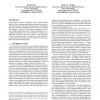Free Online Productivity Tools
i2Speak
i2Symbol
i2OCR
iTex2Img
iWeb2Print
iWeb2Shot
i2Type
iPdf2Split
iPdf2Merge
i2Bopomofo
i2Arabic
i2Style
i2Image
i2PDF
iLatex2Rtf
Sci2ools
107
click to vote
KDD
2009
ACM
2009
ACM
The role of game theory in human computation systems
The paradigm of “human computation” seeks to harness human abilities to solve computational problems or otherwise perform distributed work that is beyond the scope of current AI technologies. One aspect of human computation has become known as “games with a purpose” and seeks to elicit useful computational work in fun (typically) multi-player games. Human computation also encompasses distributed work (or “peer production”) systems such as Wikipedia and Question and Answer forums. In this short paper, we survey existing game-theoretic models for various human computation designs, and outline research challenges in advancing a theory that can enable better design.
Related Content
| Added | 20 May 2010 |
| Updated | 20 May 2010 |
| Type | Conference |
| Year | 2009 |
| Where | KDD |
| Authors | Shaili Jain, David C. Parkes |
Comments (0)

